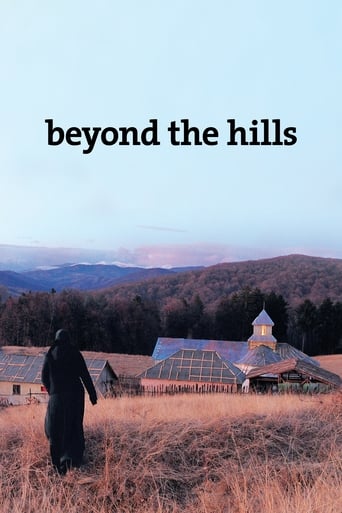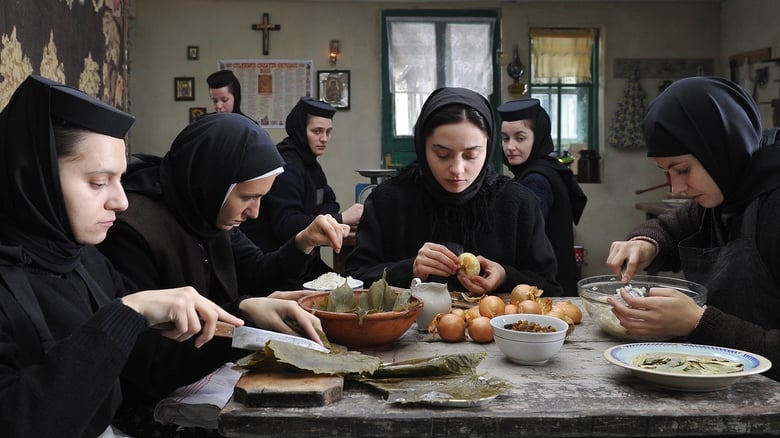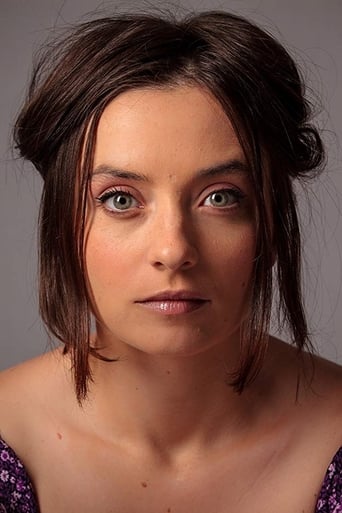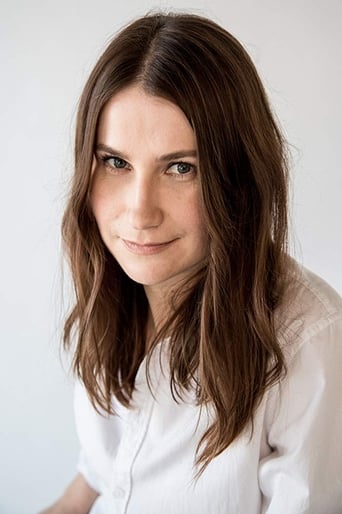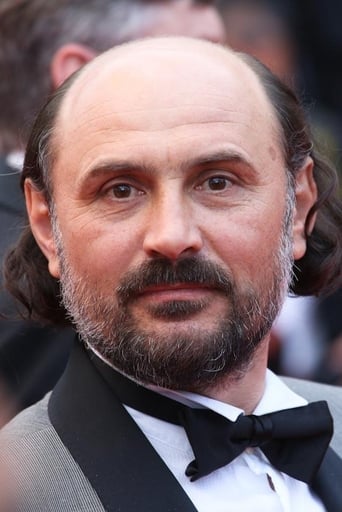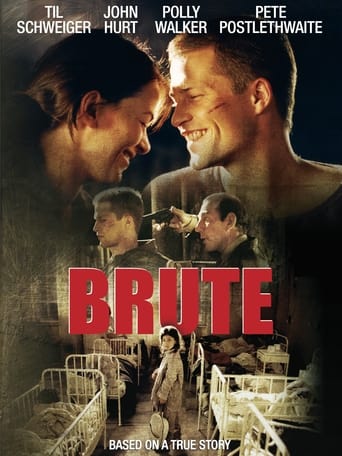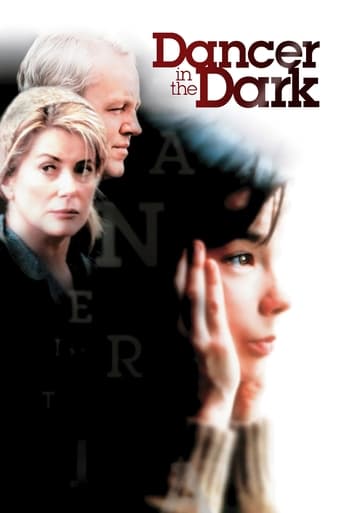Beyond the Hills (2012)
Alina returns to Romania from Germany, hoping to bring Voichita—the only person in the world she loves and was loved by—back with her. But Voichita has found God, and God is the hardest lover of all to best.
Watch Trailer
Cast


Similar titles
Reviews
Must See Movie...
It is an exhilarating, distressing, funny and profound film, with one of the more memorable film scores in years,
It’s sentimental, ridiculously long and only occasionally funny
An old-fashioned movie made with new-fashioned finesse.
'Based on a true story' – a phrase that can cover so many bases - is the slow-burning and languorous Romanian film Beyond the Hills.Set predominantly in a monastery in a bleak and poverty-stricken district, it is a complex and multi-layered film revolving around two young women, Alina and Voichita. Previously childhood friends then lovers, their lives intertwine once more when Alina returns from working in Germany in an attempt to once more enter into a relationship with Voichita who has since taken Holy Orders and is living the chaste and extremely frugal life of a nun. The rekindling of the relationship was always doomed and as Alina's mental health deteriorates with the realisation that she will not achieve her objective, she provokes a series of events culminating in the belief by some that she is possessed and needs cleansing.A Romanian film about faith, despair and unrequited lesbian love in an impoverished monastery was never likely to be an action-packed, sensationalist blockbuster. It is long at 155 minutes and its pace tends to alternate between dead slow and stop. It's the sort of a film which will take over 5 minutes to show a nun leaving the kitchen to draw water from the well and return to the kitchen with no dialogue or plot advancement throughout that period. But it is a film that has the courage to take its time, confident that it can draw you into the lives of the people whose story it tells. And on the whole it succeeds.There are no real villains or heroes in the film. It does not take the easy route to mock and blame religion for out-dated belief – when a nun believes she has been sent a sign from God and goes all peculiar, the Orthodox Priest in charge cuts down the hysteria curtly and tells her and the other nuns to move on. No, the people shown in this film, be they doctors, police or those of the cloth, are portrayed as well-meaning individuals all looking to do no harm even if, like all of us, they can be judgmental and self-righteous on occasion. Beyond the Hills is an unashamedly bleak and ultimately very sad film which gives no answers but merely records events leaving its audience to draw their own conclusions.Cinematography was good, though the constant sound of the ever-blowing wind was sometimes crude and off-putting.And there was an early failure of the sub-titles. When Alina first arrives at the monastery, the camera concentrates on a hand-written sign at its entrance. It's clearly of some import for it to be shown so, but the audience is not let in on its message. Post-film research ascertained it stated, words to the effect: This is the House of God. Forbidden to those of different religion. You must believe and not doubt. It would have explained much.
Romanian screenwriter, producer and director Cristian Mungiu's fourth feature film which he wrote and produced, is based on real events which took place in Moldova in 2005 and two non-fictional novels by Romanian author Tatiana Niculescu Bran. It premiered In competition at the 65th Cannes International Film Festival in 2012, was screened in the Masters section at the 37th Toronto International Film Festival in 2012, was shot on location in Romania and is a Romania-France-Belgium co- production. It tells the story about a 24-year-old woman named Alina who travels by train from Germany to Romania where she is reunited with her friend named Voichita whom she was separated from after they left the orphanage they lived in and choose different paths. Voichita whom has become a nun at an Orthodox monastery now lives up in the mountains nearby a village with a monk called Papa and a sister called Mama whom she and the other nuns who lives there regards as Father and Mother superior. Alina is allowed to stay with Voichita after Voichita tells the priest about Alina's situation, but Alina is not a believer in the same sense as the other ones there and when she realizes how devout and accustomed her former roommate has become to her new life, she begins to question the monk. Distinctly and engagingly directed by European filmmaker Cristian Mungiu, this finely paced and somewhat fictional tale which is narrated from multiple viewpoints though mostly from the two main characters' viewpoints, draws a consistently gripping and dense portrayal of how a Romanian woman reacts when she learns that the only person in the world whom she trusts and loves has developed an unconditional love for God and renounced her love for real human beings, and how the monk and nuns at a monastery reacts when a woman who does not share their beliefs rocks their boat in the name of love. While notable for its naturalistic milieu depictions, low-keyed and nuanced cinematography by cinematographer Oleg Mutu, production design by production designers Calin Papura and Mihaela Poenaru, costume design by costume designer Dana Paparuz and use of sound, this dialog-driven and narrative-driven story about intentions, choices, the transformation of a person's personality through indoctrination and the, in this particular case, conflict between sanity and hysteria where materialism and science is replaced by imposed solitude and superstitious experimenting on human lives, depicts two interrelated studies of character about two friends with afflicting and harsh backgrounds who are united by a human connection and separated by religious doctrines. This psychological, literary, non-judgmental and atmospheric love-story which was chosen as Romania's official submission to the Academy Award for Best Foreign Language Film at the 85th Academy Awards in 2013, which is set during a spring in a patriarchal cloister in Romania in the 21st century and where a minor community is trying to get their church consecrated by a bishop, a woman tries to the get her friend to move to Germany with her and religion is a character in itself which confines and directs the other characters, is impelled and reinforced by its cogent narrative structure, substantial character development, efficient continuity, masterful screenplay, multiple and interrelated themes, unsettling undertones, moral intricacies, refined characters, thorough depiction of the nuns' lifestyle, the pivotal scene towards the end when the voice of reason takes command, the subtly understated acting performances by Romanian actresses Cosmina Stratan and Cristina Flutur in their debut feature film roles and the fine acting performances by Moldovan actor Valeriu Andruita and Romanian actress Dana Tapalaga. A phonetic, dramatic and tragically heartrending mystery which gained, among several other awards, the award for Best Director Cristian Mungiu and the award for Best Actress Cosmina Stratan and Cristina Flutur at the 65th Cannes Film Festival in 2012.
In 2005 a Romanian nun was bound and gagged and tied to a makeshift cross. She was dehydrated, starved and suffocated for three days until she died. The people in the Romanian village of Tanacu who had imprisoned and murdered twenty-three year old Irina Maricica Cornici were a monk and four other nuns belonging to the Orthodox Church. They had been attempting to perform an exorcism on Irina because they believed that she had been possessed by the devil. She was previously diagnosed by a hospital as suffering from schizophrenia. Two years later, the priest was sentenced to fourteen years in prison. Romanian filmmaker Cristian Mungiu (4 Months, 3 Weeks and 2 Days) has written a friendship of two girls around these events, while still treating the case with accuracy and tact. He has stated that he wanted to make a film about the passivity of the world and to encourage people to have an opinion, rather than merely accepting daily habits as inconsequential. He has also said that he didn't want the film to be made of goodies and baddies. The natural performances from several first time actors sidestep the trap of simplicity. The film is a critique of the dangers of segregated communities. It is not an anti-religious film but one that displays the incompatibility of the values of the inner and outside world. Where do we stand once we realise both are as oppressive and doomed as each other? In their first feature roles Cristina Flutur and Cosmina Stratan play Alina and Voichita, two girls who used to live in an orphanage but were separated. Alina returns from Germany to visit Voichita who is now living in a convent as a nun. They used to belong to each other but Voichita declares that she Alina in a different way now and that her heart is strictly with God. The convent they are staying in has no electricity and supposedly no regard for money either. It relies on manual labour from the other nuns and also the head priest (Valeriu Andriuta). The regime is strict because the priest has little patience for any scandals and the rules are dogmatic. Chaos erupts when the other girls claim that Alina tried to hurt herself and began attacking people and she has to be taken to hospital. Mungiu has a staggering eye for detail and great patience for visualising spatiality. Using clear hand-held cameras, many scenes are filmed in long, single takes and the duration of the shots shows the containment of the spatiality of the nuns' lives and the remoteness of the community. The effect of static formalism is that it infers their lack of consciousness about the outside world and modern sensibilities and values. Similarly, a wide angle shot from the top of the hill expresses the physical and mental distance between the Church and the rest of the society. Subtle contrasts in costumes, including the black robes of the nuns juxtaposed again Alina's Rebook tracksuit top further visualise the conflict of the two worlds and their values. Personalising the notion of the spiritual pitched against the modern world are the relationships of the girls. Alina and Voichita's conversations are a binary forged between two contrasting ideas of love: those who believe in the tangible and physical meaning and spiritual satisfaction through prayer and dedication only to God. Voichita confesses her faith to Alina: "I've got someone else in my soul now". Both performances are pitched with a quiet naturalism that prevents their immensely convincing work from straying into caricatures. Voichita and the priest aren't portrayed as villains but as people who are unfamiliar with the outside world and unshakable in their faith because this is how they've been conditioned and how they discipline themselves. One final image in the film fascinates but also reveals some limitations. It is the sight from the police car of a modern world that is loud, unruly and disrespecting of the law. How would some of these characters respond in the outside world? Is there any hope that they will adapt to the modern world when they are taken to gaol and have to come to terms with the boundaries of modern society? By working strictly in the frame of the real events, thorough character development isn't on Mungiu's mind. He ends the film with a brilliantly provocative note but one that is also verging closely on unsalvageable nihilism for humanity.
Beyond the Hills is an intense film narrating the relationship between two friends, who were once raised in an orphanage together. Alina, a waitress in a bar in Germany visits her friend Voichita, who is now a nun in an orthodox church in rural Romania. Serene atmosphere in the church is shaken upon the arrival of Alina. Incidents that follows seriously raises the questions of conventional religious rituals and shakes the conscience of the audience in Mungiu's style.Even said that the movie deals with the relationship, but that is in the backdrop of the religious practices that are carried out with strong beliefs. Brings out the unquestionable faiths to be subjected for assessment.Movie is pretty intense and it grabs the attention of the audience within a minute or so and keeps you completely engrossed for two and a half hours. Opening scene at the railway station needs a special mention that presents both the characters beautifully.Excessive usage of hand-held camera has been a letdown at some places where a smooth camera movement wouldn't have disturbed audience concentration. Excellent dialogs but seems to be bit excessive and some of them not that important with the story could have been avoided. Absence of BGM throughout the movie and just with the sounds of the ambiance probably makes the audience glued but the failed to make the impression that visuals combined with music can together create.Both the lead actress Cosmina Stratan as Voichita & Cristina Flutur as Alina are pretty good in their roles but the lack of scope on the characterization was a bit let down especially for Cosmina Stratan. Few more shots to reflect her emotions & character might have earned high recognition. But whatever the scope provided all the actors were brilliant.Watching '4 Months, 3 Weeks and 2 Days' was an unique experience as never one has watched such a style on screen before. Beyond the hills is presented with the similar style but still a very good film in its scope.Cristian Mungiu will be on the watch list of many movie bluffs hereafter.

